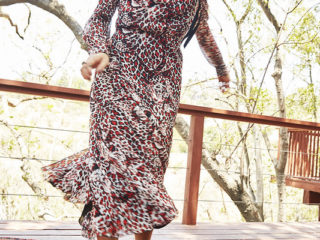Anger is a complex emotion, particularly for women. There are many messages on how to express it and respond to it. Many of us were taught that if we were angry, it would close doors of opportunity or damage relationships.
We heard things like, “It is not ‘becoming’ of you.” There are others who have been on the wrong side of someone offloading their anger in a harmful way, leaving you with echoes of fear and shame.
The idea of embracing our anger can feel dangerous, and there is a fear that it can burn us. We have all been there, but we can’t let that keep us from trying to repair our notion of anger—where it is not defined by poor models and mistakes of the past but instead informed by clarity, confidence and compassion.
A mindset shift around anger can be a game changer for our health, relationships with ourselves and others, work and our ability to use our voices for the greater good. Befriending anger allows us to control it, instead of it controlling us. Building a healthy relationship with anger often diffuses it and allows us to understand what is behind the anger—wherein wisdom lies.
A mindset shift around anger can be a game changer for our health and our relationships with ourselves and others.
The Impact of Unaddressed Anger
When you stuff, hide, minimize and deny anger—it still has to go somewhere. Your body tells the story of unaddressed anger through somatic struggles like headaches, gastric distress (aka bloating, diarrhea, vomiting and nausea), poor sleep, poor appetite or messed up hunger cues, stomach pain and chronic pain.
Unaddressed anger increases numbing behaviors such as substance use and abuse. Other signs of suppressed anger are perfectionism, feelings of overwhelm, disordered eating, migraines, chronic fatigue and mood struggles such as depression and anxiety.
Nothing good comes from stuffing anger internally. Pick your battles, yes. However, denying, minimizing and denying will only harm you. Your body will make sure you hear loud and clear, enough is enough. Righteous anger expressed, not stuffed, is a part of living well.
Righteous anger expressed, not stuffed, is a part of living well.
The Dangers of Using Anger Incorrectly
Anger can be used as a weapon, a way to power through something or to achieve a specific agenda. While this can be effective, it is also be crushing for the people in the line of your anger. We see examples in history and in our current culture of how using anger incorrectly can equate to bullying. When anger is motivated by fear, of others or the unknown, the change we aim to create can instead only further entrench us in our pain.
Responding to Anger
When anger shows up, it is indeed powerful and can be all-consuming. It is often activated by an event, experience or memory. Righteous anger fuels courage and the need for change. It is why we march. It is why we stand our sacred ground and say, ‘No more!” It is why we leave, move or go for a new opportunity instead of tolerating the status quo.
There is often a fear of being misunderstood, rejected, losing community or getting push-back—even when we use our anger to inspire positive change in our lives. The reality is these things will probably happen. Yet, if we let the fear of hard things happening keep us from moving forward in our truth and our healing, we will stay living a small life.
When thinking about how to respond to anger toward ourselves or others, remember to:
- stay curious about its fears and concerns and about how it is trying to protect you
- assess what support you need before responding
- respect and witness this anger.
Take your time here as this is where befriending anger happens and things begin to shift. - practice taking action from this wisdom.
- give yourself permission to mess up. A lot.
It will be an imperfect process, but it fuels freedom.
How do you process your anger in a healthy way? What tips do you have for dealing with anger?
Images via Sarah Kehoe, Darling Issue No. 19












4 comments
Charmaine – Ahh, our loved ones get the best and worst of us! Leading from a clearer head helps us stay aligned with our integrity. Emotions are powerful teachers and hold a lot of wisdom – I love the pause and take a moment practice you have. 🙂
“Your body tells the story of unaddressed anger through somatic struggles like headaches, gastric distress (aka bloating, diarrhea, vomiting and nausea), poor sleep, poor appetite or messed up hunger cues, stomach pain and chronic pain. Unaddressed anger increases numbing behaviors such as substance use and abuse. Other signs of suppressed anger are perfectionism, feelings of overwhelm, disordered eating, migraines, chronic fatigue and mood struggles such as depression and anxiety. ” I’ve had all of these problems my whole life, more recently, counseling, journaling and people let me express all of me have helped immensely!
Thanks for reading, Kay! So glad this resonated with you. I am also thrilled you are feeling the fruits of your investment in therapy, journaling, and quality people in your life.
I’m known for being short-tempered, especially to my loved ones. I’ve been trying to take a moment for myself first when I feel angry – clear my head instead of reacting with my emotions!
–
Charmaine Ng | Architecture & Lifestyle Blog
https://charmainenyw.com